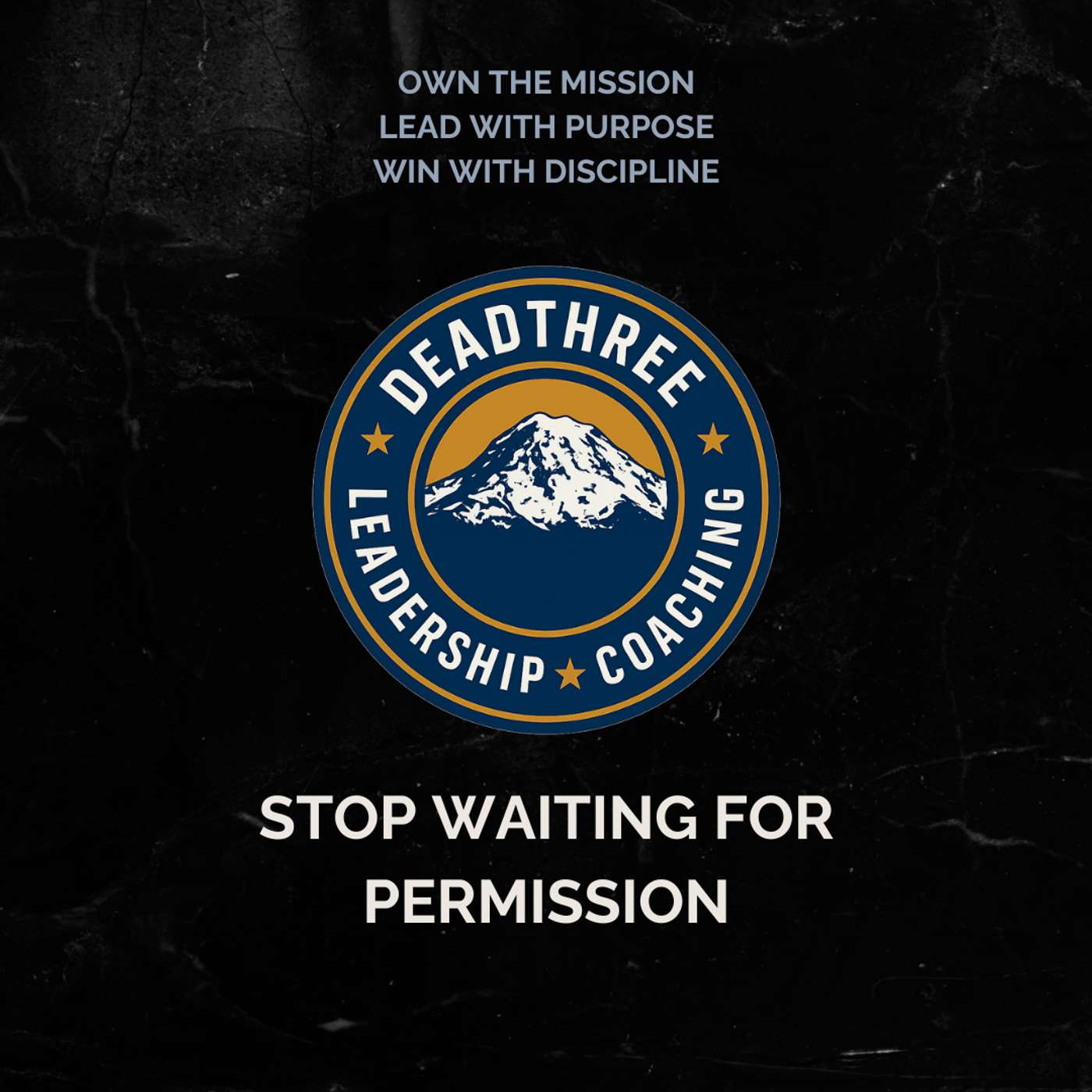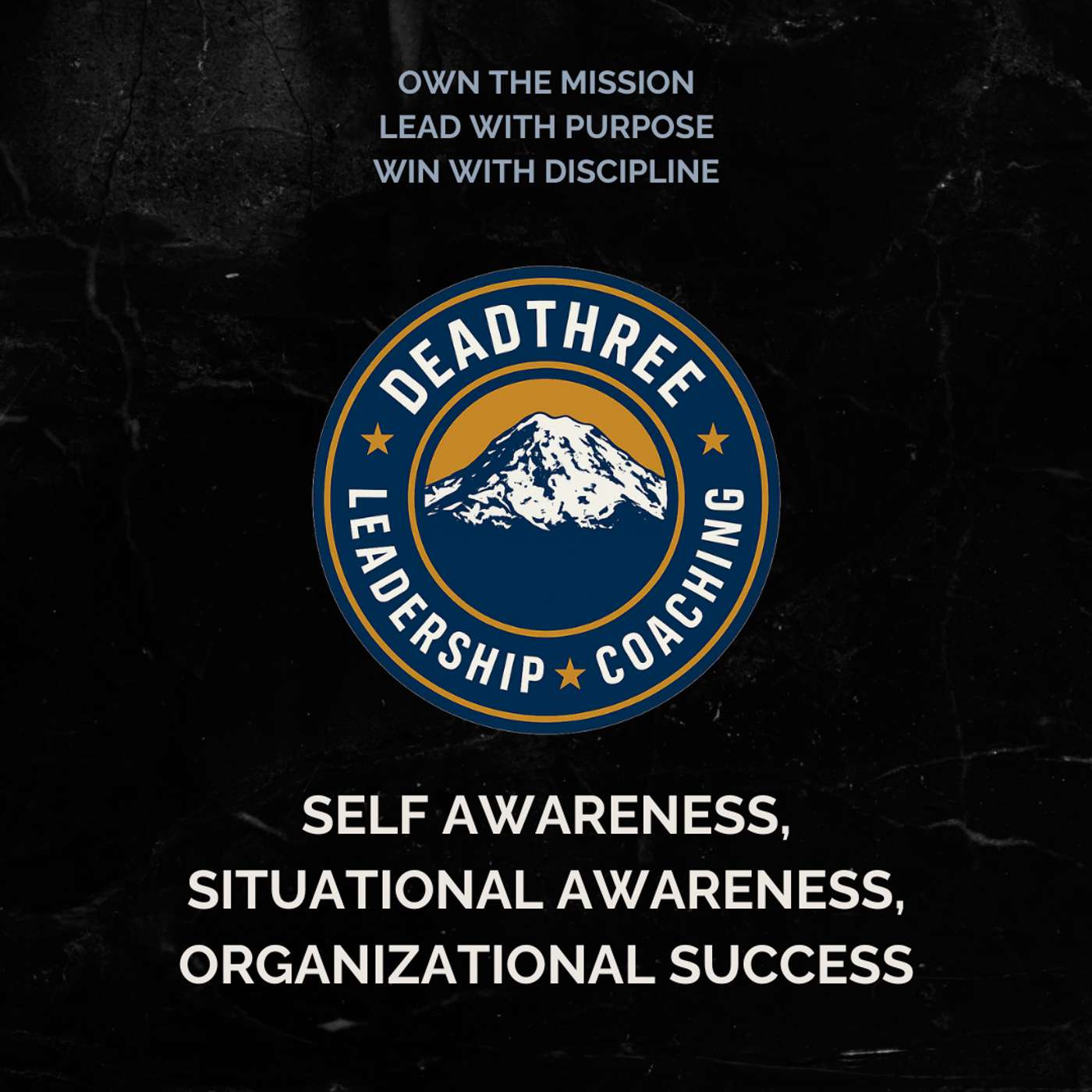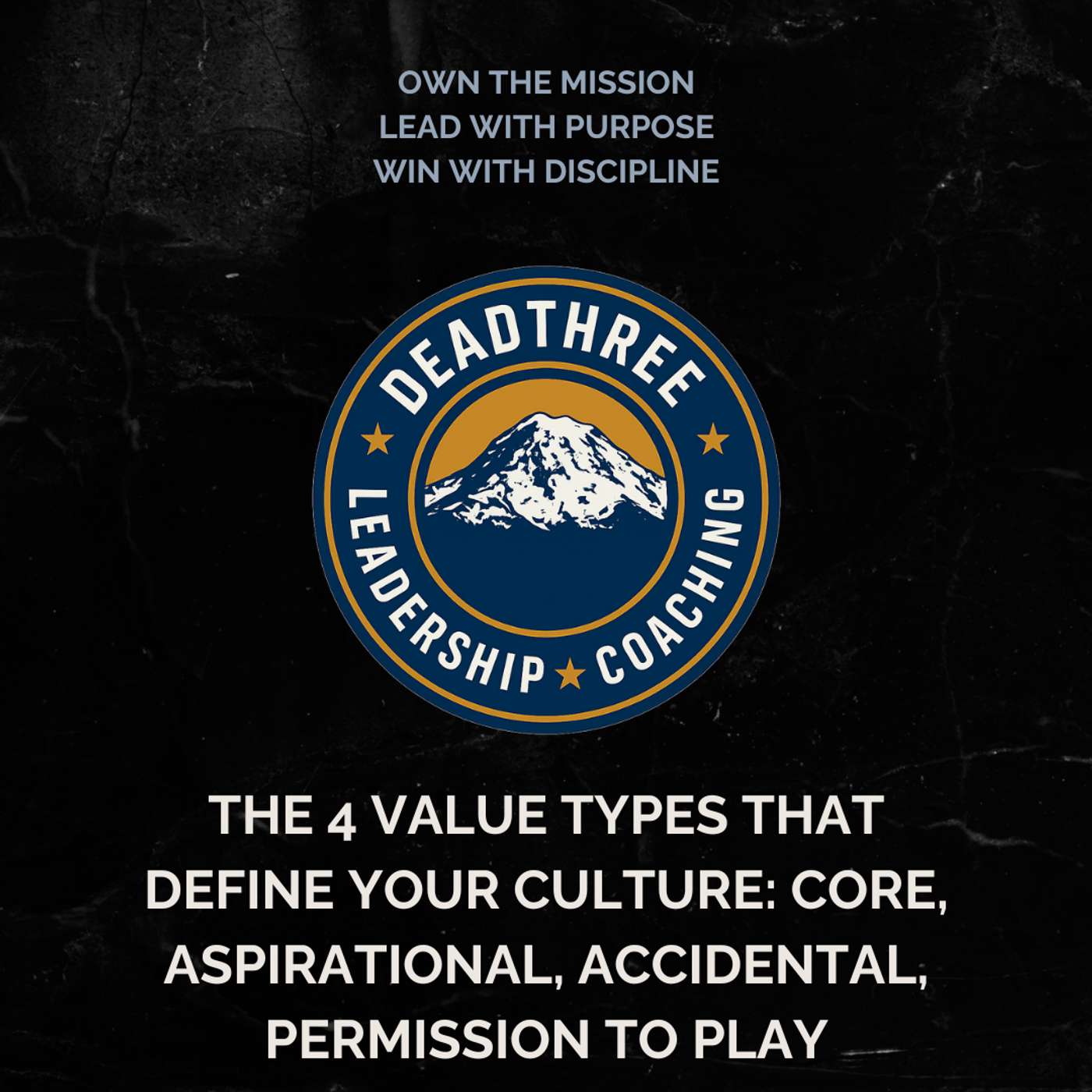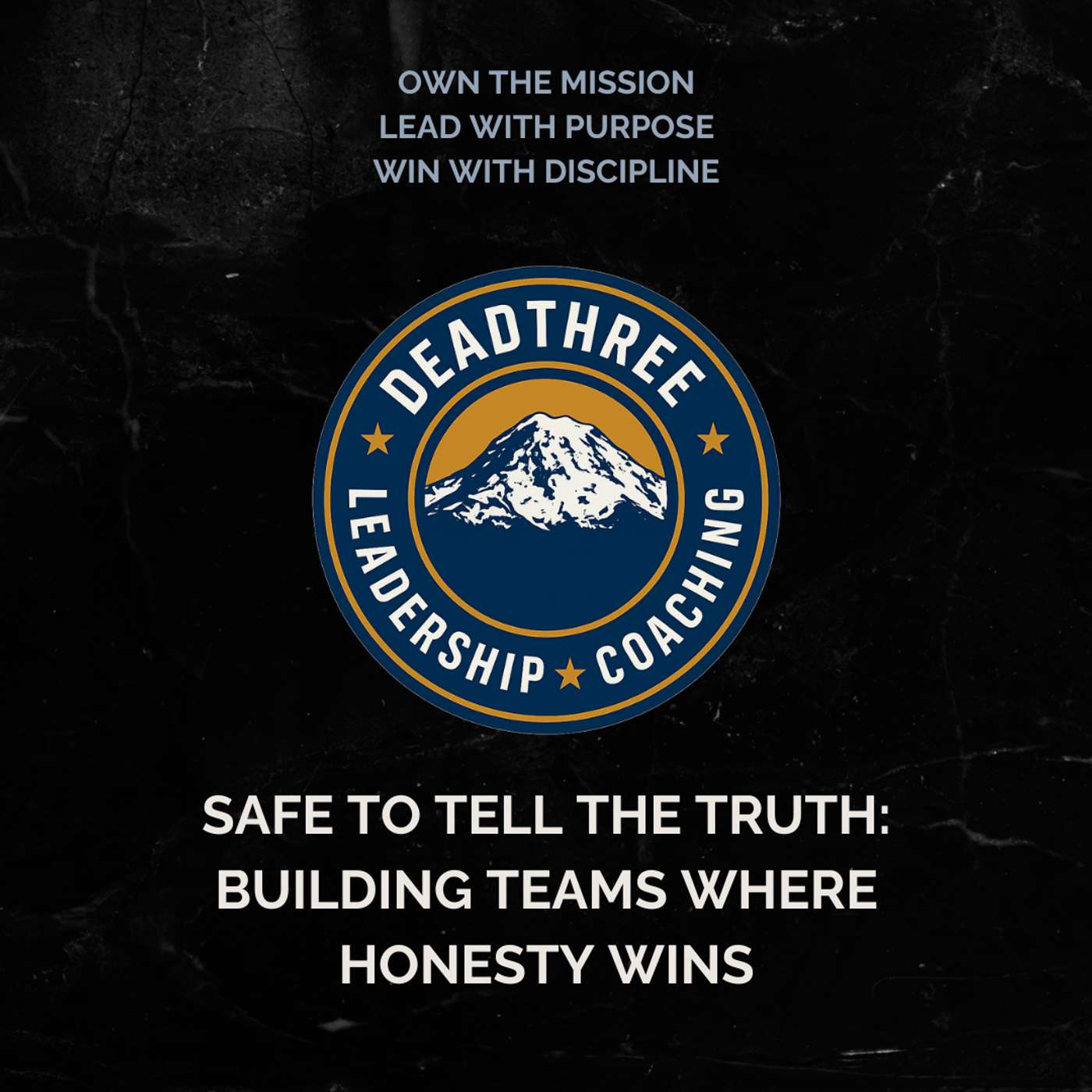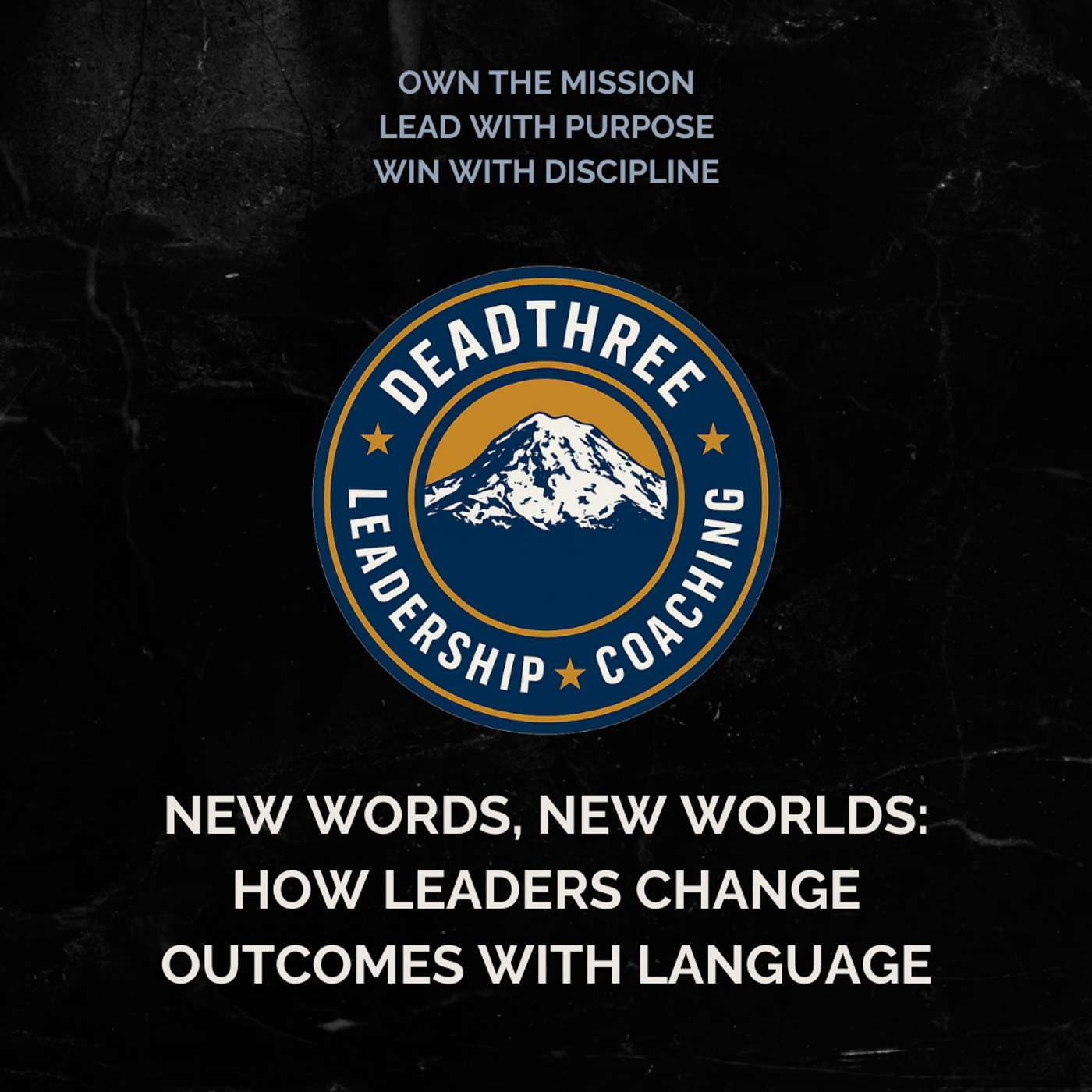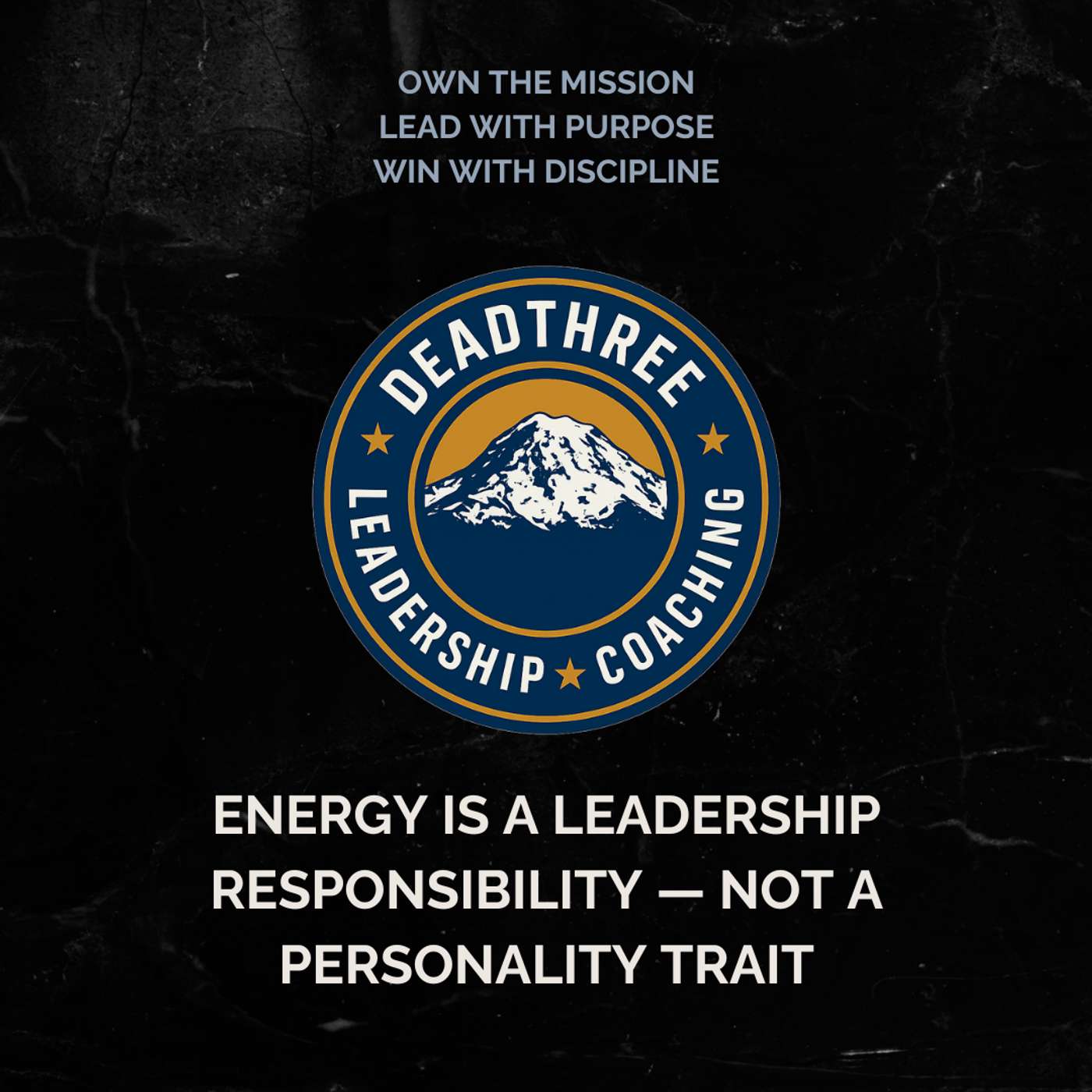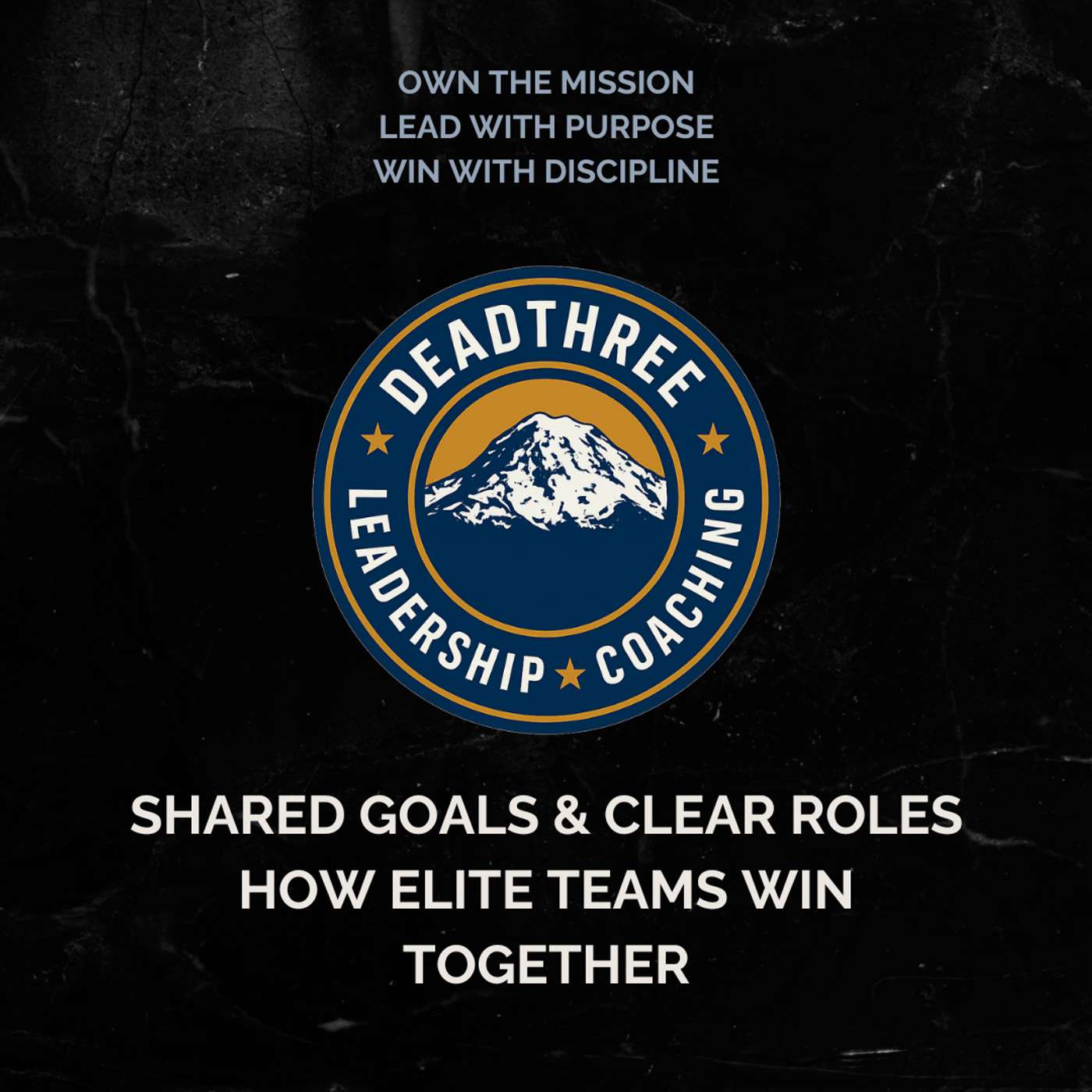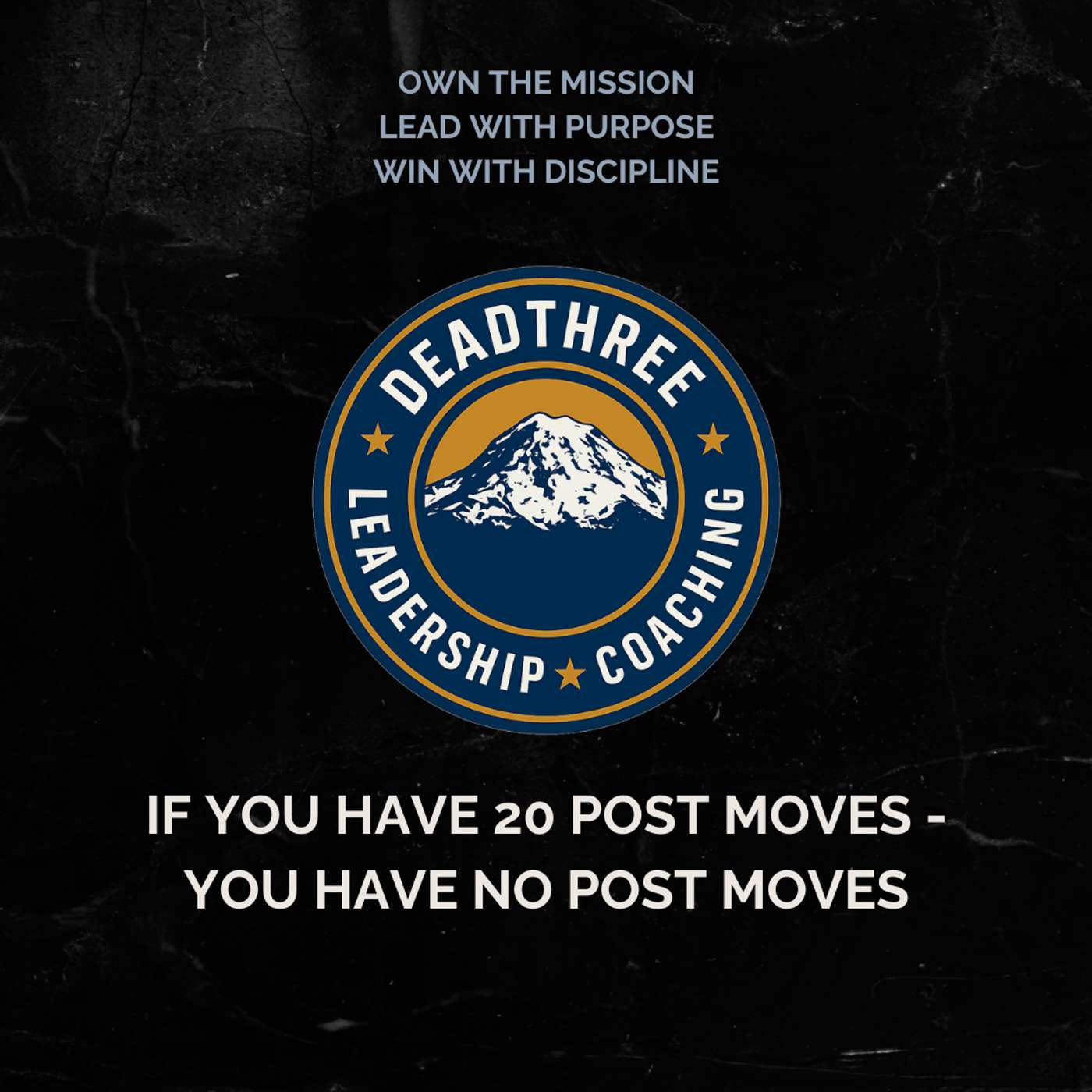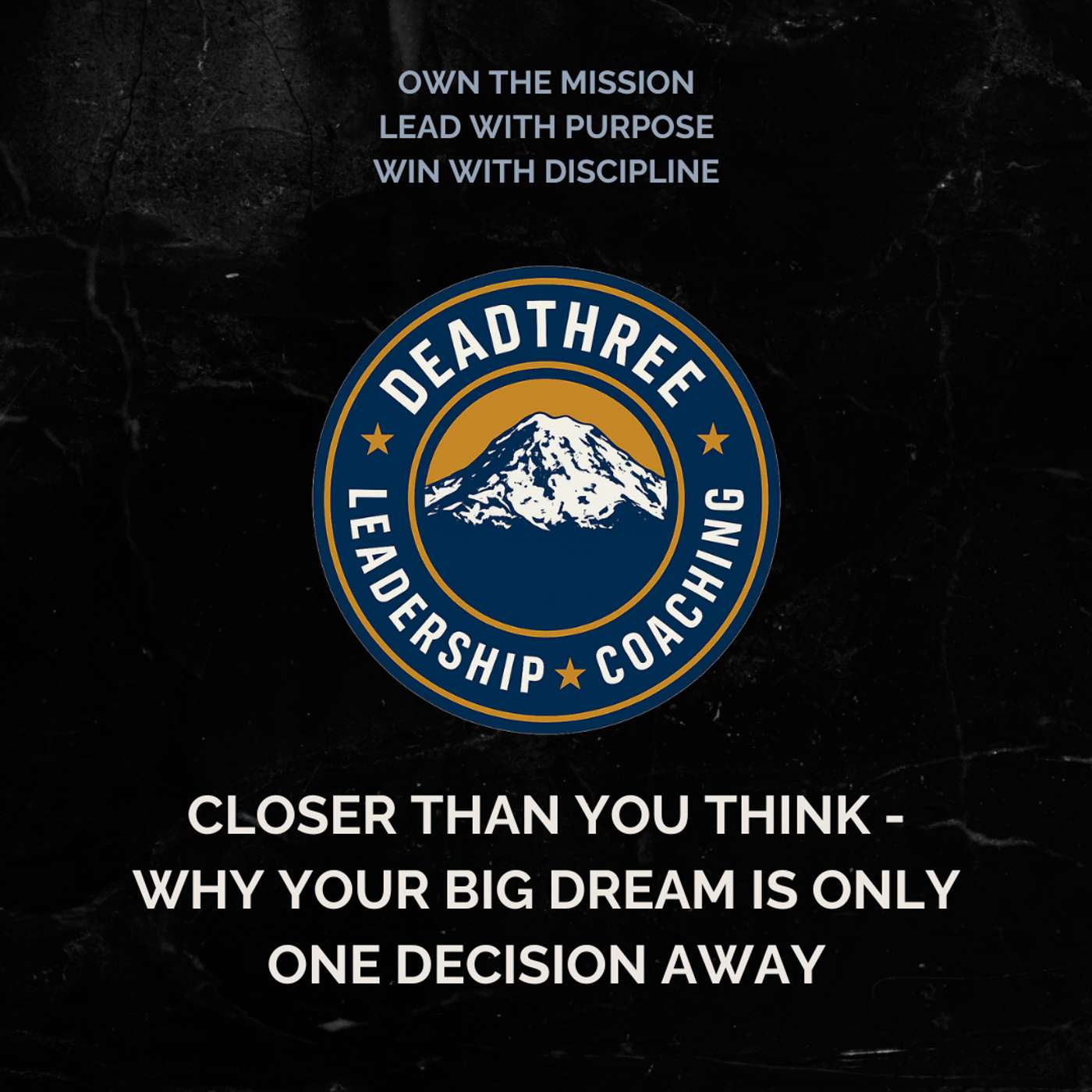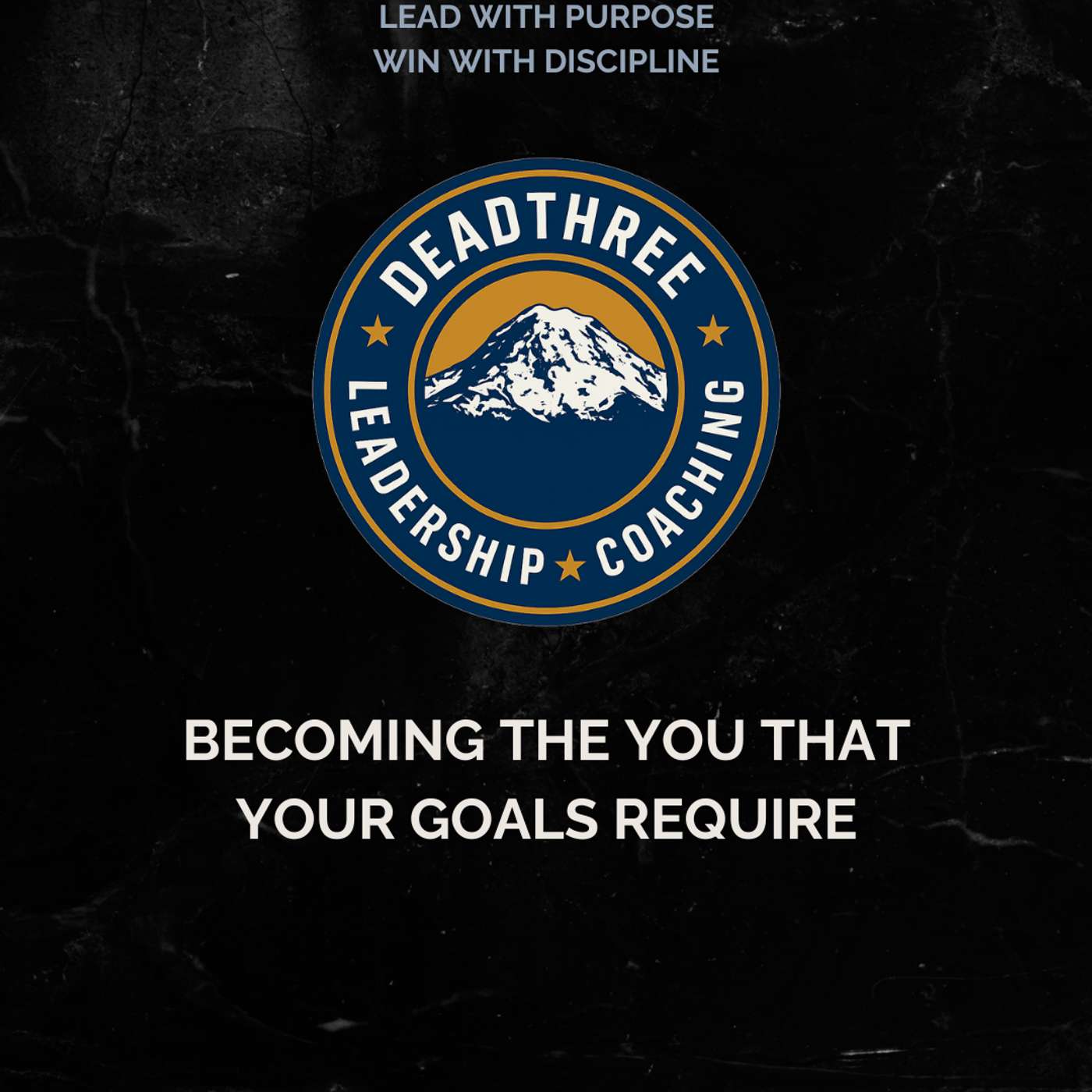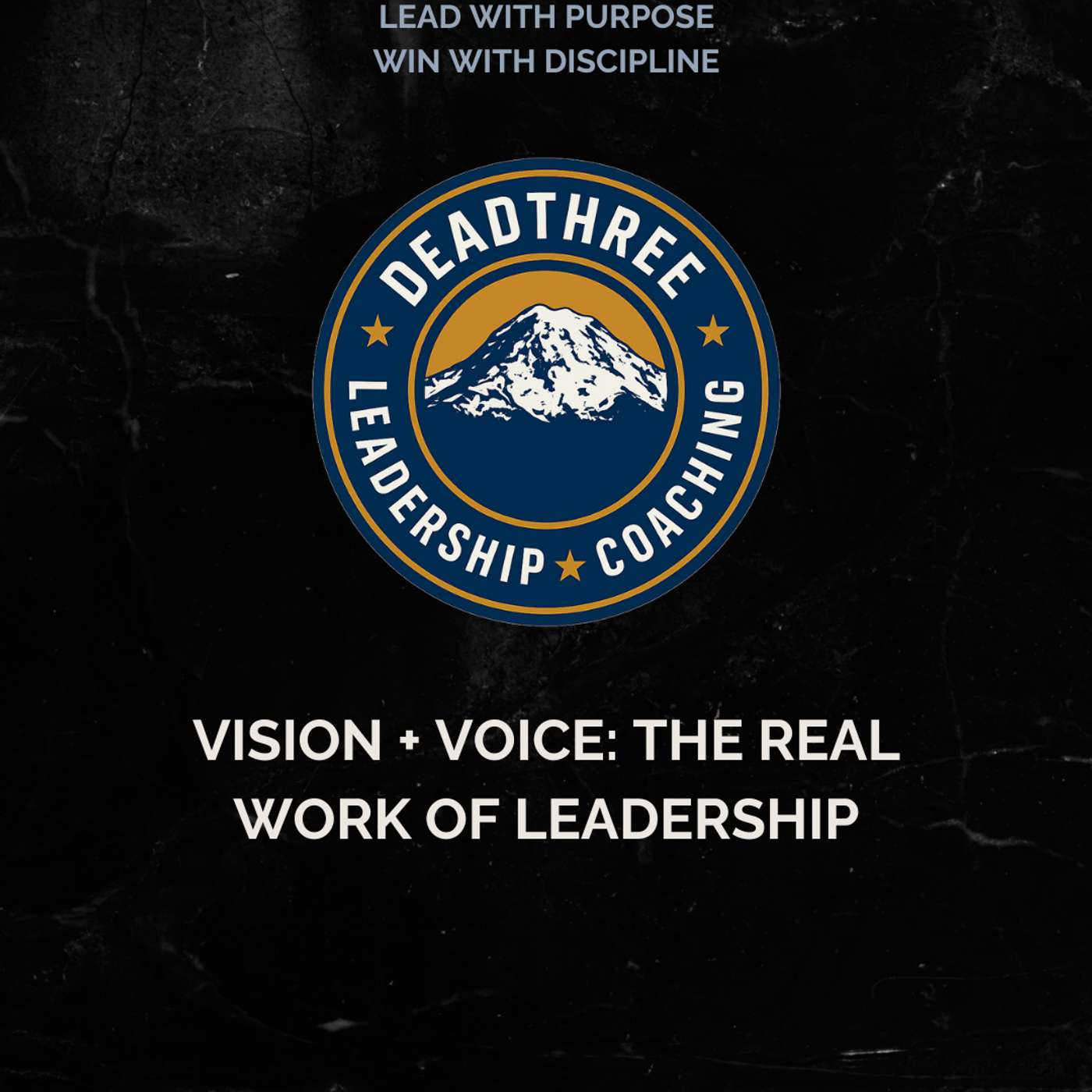Discover DeadThree - Coaching and Leadership Development
DeadThree - Coaching and Leadership Development

DeadThree - Coaching and Leadership Development
Author: George Evjen
Subscribed: 2Played: 0Subscribe
Share
© 2025 George Evjen
Description
Welcome to DeadThree Coaching, Leadership and Development podcast, where we explore the secrets of unlocking your full potential. Join us as we explore powerful strategies and insights from the world of coaching, leadership, and personal development. From examining the mindset of champions to sharing practical tips for effective leadership, our episodes are designed to inspire and empower you on your journey towards success. Get ready to elevate your skills, boost your motivation, and cultivate a winning mindset. Tune in to DeadThree Coaching, Leadership
Development podcast and unleash your true potential.
Development podcast and unleash your true potential.
112 Episodes
Reverse
In this episode of the DeadThree Coaching Show, we confront one of the biggest barriers to growth — the permission trap.Most people are sitting in the audience, waiting to be chosen. Waiting for validation. Waiting for someone to notice their effort, hand them the opportunity, and tell them it’s “their time.” But here’s the truth: nobody’s coming. The spotlight isn’t handed out — it’s taken.Drawing from powerful stories and real experiences, George challenges you to stop waiting for the right time, the right approval, or the perfect conditions — and to simply move.This episode dives deep into the difference between humility and hesitation, between fear and courage, and between average and elite.You’ll hear lessons inspired by leaders like Ben Newman, Ed Mylett, and Jesse Itzler, along with a vivid story of a motivational speaker holding up two books — one simple act that reveals the truth about action, confidence, and self-belief.👉 Inside This EpisodeWhy most leaders and creators are stuck waiting for permission instead of taking initiative.The mindset shift from “I hope they notice me” to “I’m going to go take it.”How comfort disguises itself as humility — and why that’s killing your growth.The story of “the books on stage” — a powerful visual of courage and movement.Why confidence doesn’t come before action — it comes because of action.How to use courage and consistency to make yourself “too good to ignore.”The difference between standards and permission — and why the world rewards consistency, not compliance.🔥 Three Actions to Take TodayPush back your chair — identify one area where you’ve been waiting and take the first step today.Revisit your standards — make sure they’re higher than your need for validation.Create momentum — keep promises to yourself daily; confidence is built through consistency.💬 Quote to Remember“When your preparation is solid and your habits are tight, you don’t need permission. Your work becomes your validation.”
In this episode of The DeadThree Coaching Show, we explore one of the most overlooked — yet defining — qualities of elite leadership: the ability to inspire instead of manipulate.Too many leaders rely on pressure, titles, or authority to drive results. But true leadership? It’s not about forcing people to perform — it’s about inviting them to believe. It’s about inspiring ownership, purpose, and pride. When people feel seen, valued, and inspired, their performance doesn’t need to be managed… it becomes self-sustaining.Drawing from recent DeadThree client experiences, sports analogies, and real-world leadership examples, this episode dives deep into the mindset shift that separates short-term managers from lifelong leaders.👉 Inside this episode:The difference between manipulation and inspiration — and why one builds trust while the other destroys it.How to create environments where people choose to show up, not just comply because they have to.Why inspired teams perform longer, stay loyal, and produce results that pressure can’t touch.The role of authentic energy, clarity, and belief in leading high-performance cultures.The internal question every leader must ask daily: “Am I pushing people… or pulling them forward?”🔥 Three Actions to Take This Week:Audit your leadership moments. Reflect on where you’re using authority instead of inspiration.Find your people’s why. Ask, listen, and connect every task back to something meaningful.Lead with belief. Let your team feel your conviction — not just hear your commands.Because leaders who manipulate may win the moment,but leaders who inspire?They win for a lifetime.
In this episode of the DeadThree Coaching Show, we unpack one of the most underestimated skills in leadership: awareness.Too often, leaders believe their job is simply to make decisions. The truth? If you don’t understand yourself, your people, and your environment, every decision is just a guess.We break awareness into three levels:Self-Awareness: Knowing your blind spots, your triggers, and the impact your emotions have on others.Situational Awareness: Reading the room — noticing energy, morale, tone shifts, and what your team actually needs.Organizational Awareness: Zooming out to see if actions truly align with values and mission, not just busyness or optics.From Ed Mylett’s principle of transferring belief, to Danny Hurley’s crash course in emotional self-awareness, to lessons from Jocko Willink and legendary coach Don Meyer — this episode shows how the best leaders sharpen their radar.👉 Inside this episode:Why awareness is the bridge between your intentions and your impact.How lack of awareness derails even elite leaders.Why your team feels your blind spots long before you do.The difference between paranoia and presence.A daily reflection practice to start building A+ awareness today.Because here’s the bottom line: If you can’t read the room, the room will read you.
In this episode of the DeadThree Coaching Show, we go deeper than the typical “values on a wall” conversation. Values aren’t just inspirational words slapped on a mouse pad — they’re the standards you live, the non-negotiables that guide your actions, and the silent forces that either strengthen or erode your culture.I share a personal story from my own community — about a man whose life embodied service, sacrifice, and togetherness without ever needing to announce it. His actions, not his words, made his values crystal clear. That contrast raises the tough question: are the values you claim really your core values—or are they just aspirational words you hope to live up to?👉 Inside this episode:The four types of values every leader must understand: Core, Permission-to-Play, Aspirational, and Accidental.Why “permission to play” values like teamwork and integrity are the minimum price of admission, not your differentiators.How accidental values (like rewarding last-minute heroes) creep in and quietly sabotage your culture.Why clarity is everything: vague one-word values like “teamwork” or “service” leave too much room for confusion.The tough audit leaders must do: which values are actually lived out—and which are just tolerated or aspirational?We’ll finish with the challenge: identify your three to five true core values—the ones you refuse to waver on, the ones that define your team in every moment. Because at the end of the day, you don’t rise to the level of your aspirations. You fall to the level of your values.Because remember: you get what you tolerate.Connect with UsJoin the community: ongoing conversations, tools, and accountability.https://community.deadthreecoaching.comGrab the DeadThree Quarterly Planner to structure your standards, reps, and weekly recovery.https://deadthreecoaching.com/plannerVisit our Website.https://deadthreecoaching.com
In this episode of the DeadThree Coaching Show, we tackle a season every leader knows too well: when everything feels cloudy—direction, roles, priorities, energy. Clarity won’t magically appear. As Ed Mylett says, “clarity is the child of courage.” It’s your job as a leader to create it.Pulling from Patrick Lencioni’s The Advantage, we break down the difference between smart organizations (strategy, tech, marketing, finance) and healthy organizations (low politics, low confusion, high morale, high productivity, low turnover)—and why most teams over-index on “smart” and ignore “healthy.”👉 Inside this episode:Smart vs. Healthy: Why elite execution requires both—and why health is the real competitive edge.The Clarity Flywheel:Create clarity (direction, roles, milestones, definitions of “done”).Overcommunicate clarity (daily, not annually—until people can repeat it back).Reinforce clarity (cadence, metrics, accountability, recognition).Activity ≠ Accomplishment: John Wooden’s reminder not to confuse motion with progress.The Burnout Trap: Business without clarity is the fastest way to burn out without a breakthrough.A live case study: How milestones, daily touchpoints, and accountability helped a cross-functional team hit a critical deadline—and what we learned from the weekend push.🔧 Try this this week:Define “done.” For your top initiative, document the finish line, owners, and dates.Install an overcommunication cadence. Daily 10–15 minute standup focused only on priorities, blockers, and “done” dates.Reinforce and recognize. Celebrate milestone hits publicly; unpack misses to improve the system, not blame the people.Because when you create, overcommunicate, and reinforce clarity, you don’t just reduce confusion—you increase morale, productivity, and retention. And teams with clarity? They wake up inspired.Connect with UsJoin the community: ongoing conversations, tools, and accountability.https://community.deadthreecoaching.comGrab the DeadThree Quarterly Planner to structure your standards, reps, and weekly recovery.https://deadthreecoaching.com/plannerVisit our Website.https://deadthreecoaching.com
In this special walking edition of the DeadThree Coaching Show, we kick off Q4 with a hard truth: goals alone aren’t enough. You can write them down, tape them to your wall, or even frame them — but without systems, standards, and daily execution, they’re just words on a page.In this episode, I share exactly how I’m approaching Q4: building clarity, using AI as my accountability partner, and turning my goals into non-negotiable commitments. You’ll hear about my 9 quarterly goals, how I narrowed them to the one that matters most, and why execution beats strategy every single time.👉 Inside this episode:Why ChatGPT can be your best performance coach (if you train it right).How to turn “goals” into systems and commitments that actually get executed.Why Q4 is not a warm-up — it’s a fresh fight with 13 rounds to win.The importance of belief: Ted Lasso’s BELIEVE poster, and why you need your own version on Day 1.Why exhaustion, consistency, and daily grind are proof you’re on the right track.This isn’t about waiting for January 1st. It’s about showing up today — with clarity, with belief, and with execution that earns your results.Because goals don’t win championships. Execution does.Connect with UsJoin the community: ongoing conversations, tools, and accountability.https://community.deadthreecoaching.comGrab the DeadThree Quarterly Planner to structure your standards, reps, and weekly recovery.https://deadthreecoaching.com/plannerVisit our Website.https://deadthreecoaching.com
In this episode of the DeadThree Coaching Show, we get brutally honest about what most folks won’t say out loud: greatness is exhausting. It’s not built on hype or highlight reels—it’s paid for in the boring, repetitive, uncelebrated work you do when nobody’s clapping. We talk about why exhaustion is not a red flag but a receipt for the price you’re paying, how elite teams keep standards high when feelings get loud, and what leaders must do to carry the energy when the team is running on fumes. From the NOMA “best restaurant in the world” moment to NBA-season endurance, we unpack the habits, standards, and mindset that separate the 1% from everyone who just loves the idea of greatness.👉 Inside this episode:The truth about exhaustion: why it’s proof you’re on the right path—not a sign to quit.Standards over feelings: how elite teams avoid lowering the bar when they’re tired.The leader’s burden: why your energy sets the tone and your team will mirror it.Boring reps, big wins: the unglamorous work that actually produces championships.How teams bond in the grind: exhaustion as the common ground for trust and unity.Three Action Items (do these this week)Audit Your Standards Write down your top three standards. Ask: Do these survive when we’re tired—or only when things feel good? If they wilt under fatigue, rewrite them to be observable, specific, and non-negotiable.Schedule the Grind Put the hard days on the calendar. Let the team know what’s coming, why it matters, and how you’ll support recovery. Normalize fatigue without normalizing slippage.Celebrate the Push (Not Just the Result) End the week by spotlighting one person or moment where someone delivered despite fatigue. Name the behavior, the context, and the impact. Reinforce endurance as a cultural win.Pull Quotes“Greatness isn’t built in bursts of motivation. It’s built in the boring, exhausting, repetitive work no one claps for.”“Exhaustion isn’t a problem to fix—it’s the receipt for the price you’re paying.”“Standards don’t care if you’re tired. They’re the scoreboard of whether you’re serious about greatness.”Join the community: ongoing conversations, tools, and accountability.https://community.deadthreecoaching.comGrab the DeadThree Quarterly Planner to structure your standards, reps, and weekly recovery.https://deadthreecoaching.com/plannerVisit our Website.https://deadthreecoaching.comBecause most people love the idea of greatness. Elite teams accept the cost—and keep going.
In this episode of the DeadThree Coaching Show, we dig into the foundation of every elite team: trust that makes truth-telling safe. If someone on your team spots a problem, do they feel safe to say it out loud—or do they go quiet and hope it goes away? Using insights from Patrick Lencioni’s The Advantage, Seth Godin’s Tribes, and real-world leadership examples (including UConn’s Dan Hurley), we unpack why silence is costly and how leaders create environments where people can speak freely, fail safely, and still feel valued.👉 What you’ll learnHealthy vs. Smart Organizations: Why strategy/finance/tech don’t matter if morale is low and politics/confusion are high—and how organizational health starts with trust.The Two Kinds of Trust: Reliability (“I’ll deliver Friday at noon”) and psychological safety (“I can ask the hard question without fear”). You need both.The Cost of Silence: How unspoken problems bury mistakes, kill innovation, and drain engagement—while the conversation moves to side channels (DMs, hallways, spouses).Culture = What You Tolerate: Late arrivals, gossip, disrespect, weak meetings—each one signals what’s really allowed.Normalize Productive Conflict: Why intense, purposeful meetings (à la Hurley) surface truth, speed clarity, and accelerate execution.Change Feels Dangerous: How human nature resists disruption—and the rituals/language leaders use to make change safe and expected.⏱ Timestamps00:00 – The test of your culture: will people tell the truth?02:00 – Lencioni’s model: trust → conflict → commitment → accountability → results05:45 – The two kinds of trust and why safety matters08:30 – The real cost of silence (and where the truth goes when it’s not said in the room)12:10 – “Culture is what you tolerate”: practical examples15:10 – Making meetings intense and safe (Hurley example)18:30 – Why change feels dangerous (from Tribes) and what to do about it22:00 – Leadership consistency, accountability, and protecting trust24:30 – Three moves to build truth-safe teams this week💬 Pull quotes“If your people aren’t telling you the truth in the room, they’re already telling someone else.”“Your culture isn’t what’s on the poster—it’s what you tolerate.”“Make it safe to speak freely, fail safely, and believe deeply that what I say matters.”🔧 Try this this week (Action Items)Run a Truth Audit: Ask the team, “What’s one thing we’re not saying out loud that we need to?” Capture it. Discuss it. Decide next steps.Identify Your Tolerances: List 2–3 behaviors you’ve been letting slide (lateness, gossip, unclear ownership). Keep or kill—then communicate the standard.Celebrate Honest Mistakes: When someone raises a hard truth or owns an error, acknowledge it publicly and positively. Turn it into a learning moment.📚 Referenced ideasThe Advantage (Patrick Lencioni): Organizational health > organizational “smarts.”Tribes (Seth Godin): Culture naturally resists change—leaders must make change safe.UConn MBB / Dan Hurley: Intense meetings, high standards, high trust.👥 Who this is for Leaders, managers, coaches, founders, and team leads who want fewer politics, more clarity, higher morale, and faster execution.🔗 Resources & Next StepsJoin the DeadThree Community https://community.deadthreecoaching.comWork with us on standards, discipline, and execution https://deadthreecoaching.comBecause when honesty is safe, trust rises—and when trust rises, results follow.
In this episode of the DeadThree Coaching Show, we break down one of the most overlooked tools in leadership: the words you choose.Liz Wiseman reminds us in Multipliers: “Leaders must change the conversation. New words create new worlds.” The language you use every day either multiplies your people — building clarity, trust, and ownership — or it diminishes them, leaving confusion, low morale, and stalled progress.From locker rooms to boardrooms, your words set the tone. Whether it’s the difference between “work for me” and “work with me,” or swapping “we can’t” for “here’s how we will,” leaders who are intentional with their language create cultures where belief and performance thrive.👉 Inside this episode:Why your words are never neutral — they either shrink your team or expand it.How simple language shifts create ownership, trust, and momentum.Why organizational health depends less on strategy decks and more on daily conversations.The power of names and acknowledgement to lift engagement in any room.How consistent, disciplined language ties directly to execution in the SDC Playbook.We’ll close with three action items you can use this week to audit your words, reframe your language, and build trust through intentional communication.Because here’s the truth: your words don’t just describe your world — they create it.
In this episode of the DeadThree Coaching Show, we break down one of the most overlooked truths in leadership: energy isn’t about personality — it’s about responsibility.Your people don’t just hear your words, they catch your energy. If you walk into the room burned out, disengaged, or negative, your team will mirror it. If you show up consistent, intentional, and energized — you fuel trust, clarity, and execution.Drawing inspiration from Brendon Burchard’s High Performance Habits and the DeadThree Playbook, we explore why energy management is just as important as time management for leaders — and how discipline fuels consistent energy that drives results.👉 Inside this episode:Why energy is contagious — and how it shapes culture more than any speech.The difference between random energy vs. intentional energy and why one builds trust while the other destroys it.How self-awareness and recharge habits protect your ability to lead with energy every day.The Sunday Night Test: what your team feels at 5 p.m. Sunday predicts your culture more than any value statement.We’ll close with three action items you can take this week to bring more energy to your team, protect your own recharge, and lead at a higher level.Because make no mistake: your team is catching something from you. The only question is — what do you want them to catch?
Here’s the hard truth: most companies say they have values, but few actually live them. And when values are fake, forced, or just written on a wall without being lived out — people notice. The result? Broken trust, toxic culture, and teams who disengage or walk away.In this episode, we tackle the values problem — why empty values destroy culture, how they erode trust, and what it looks like when leaders actually embody the values they preach.What You’ll Learn in This Episode:Why “values on paper” mean nothing without consistent action.The hidden cost of fake culture — and how it drives your best people away.How authentic values fuel trust, alignment, and engagement.The role of leaders in living out values daily (not just talking about them).Practical steps to make your values real inside your team or organization.Three Actions to Take Today:Audit Your Values – Look at your company values and ask: where are we living these, and where are we falling short?Start Small, Live Big – Pick one value and model it consistently for your team this week. Real culture is built in action, not announcements.Call Out the Wins – Recognize and celebrate when people demonstrate the values in real ways. What you celebrate, people will replicate.Values aren’t just words. They’re a daily choice — and if leaders don’t live them, no one else will.
Without crystal-clear shared goals, your team’s effort is scattered. And without clear roles, even the right goal becomes a mess to execute.In this episode of the DeadThree Coaching Show, George breaks down why the most effective leaders protect two things at all costs:The team’s north star goal everyone is chasing.The clarity each person has in their role to achieve it.You’ll learn why “chaos dressed up as ambition” kills momentum, how sports teams illustrate the power of role clarity, and the leadership mindset required to keep your team aligned, accountable, and engaged.Three Actions to Take Today:Write down your team’s #1 goal for this quarter and make it visible to everyone.Clarify in one sentence what each person owns in achieving that goal.Schedule a 15-minute alignment meeting to ensure everyone’s on the same page.Join the Conversation: 👉 Follow me on Instagram, LinkedIn, and YouTube for more leadership and high-performance insights.Instagram: https://www.instagram.com/deadthreecoachingLinkedIn: https://www.linkedin.com/in/gevjen👉 Join Our Community and connect with like-minded leaders focused on growth and execution.Website: https://deadthreecoaching.comNewsletter: https://deadthreecoaching.com/newsletterCommunity: https://community.deadthreecoaching.com
In this episode, George shares a powerful lesson from Patrick Lencioni’s The Advantage:“If everything is important, then nothing is.”Through stories from his coaching days and lessons from legends like Kobe Bryant, George explains how clarity demands prioritization—both on the court and in the boardroom. When leaders dilute priorities, teams scatter their energy and achieve little of significance. But when you sharpen focus, confidence and results skyrocket.You’ll also hear about Dead3 Coaching’s ongoing 100–1–10 challenge: ✅ Serve 100 companies ✅ Empower 1,000 leaders ✅ Inspire 10,000 listenersListen in for practical actions you can take right now to narrow your team’s focus and amplify your impact.Three actions to take today:Identify one priority that will have the greatest impact on your organization this quarter.Communicate that priority everywhere—meetings, emails, sticky notes, walls.Say no to anything that pulls focus away from that priority.Questions to consider:What would happen if your team focused on just one essential priority?Where are you spread too thin?What bold decision have you been avoiding because you’re trying to do it all?👉 Join the Dead3 Community: https://community.deadthreecoaching.com
Stop Being the Answer Machine: Build Teams That ThinkQuote:"An answer solves today’s problem, but a principle solves tomorrow’s. Teach your team how to think, not just what to do." – Dan Martell In this milestone episode of The Dead3 Coaching Show, we take you inside a leadership shift that can transform your team and free up your time.The Core Message: An answer fixes today’s problem. A principle builds tomorrow’s leaders. Stop being the “answer machine” for every issue your team faces. Instead, install principles and systems that empower your people to solve problems, make decisions, and own the results.We unpack Dan Martell’s 1‑3‑1 Principle: 1 Problem, 3 Solutions, 1 Recommendation. When you teach this approach, you build a culture of ownership, not dependency.We also share:Why encouragement is the first step in building empowered teams.How to breathe belief into your people so they act with confidence.A story from legendary basketball coach Rick Majerus about creating buy‑in.Key Takeaway: Your job isn’t to hold your team’s thinking. Your job is to develop their thinking. Build principles into your playbook and anchor every decision in encouragement and belief.Three Actions to Take Today:Start using the 1‑3‑1 principle. Ask your team to bring a problem, three solutions, and one recommendation.Audit your leadership style. Are you solving too many problems instead of teaching principles?Anchor solutions with encouragement. When someone brings you a solution, speak belief into them and celebrate their win.Three Questions to Reflect On:Are you unintentionally training your team to bring only problems?What principles or playbooks could you create to teach them how to think?How can you speak more belief into your team after they recommend a solution?👉 Join the Conversation: Follow George and DeadThree Coaching for more leadership insights:Instagram: https://www.instagram.com/deadthreecoachingLinkedIn: https://www.linkedin.com/in/gevjenYouTube: https://www.youtube.com/@deadthreecoaching👉 Join Our Community: https://community.deadthreecoaching.com/
Most people think their goals are far away. That success, impact, or the life they really want is years down the road—after more experience, more resources, more perfection. But what if that’s just a perception problem?In this episode of the Dead Three Coaching Show, George Evjen challenges the idea that you're "not ready yet" and shares stories—from Ja Morant to Gary Vee to his own coaching journey—that prove how one decision, one action, or one conversation can change everything.If you've been playing small or waiting for the "perfect time," this is your sign. You're not behind. You're not broken. You're closer than you think.Key Topics Covered:Why the biggest obstacle between you and your dreams isn’t distance—it’s perceptionEd Mylett's message on personal worth and the "thermostat effect"The hidden power of one small decision or act of courageStories of Ja Morant, Gary Vee, and George’s own path to becoming a college basketball coachThe Dead Three Coaching approach: Paint reality, build a compelling vision, and take daily actionThree Questions to Ask Yourself:What dream have I been keeping at arm’s length because it feels too far away?What’s one decision I could make today that would close that gap?Have I been misjudging the distance—when really, it’s just my mindset?Three Actions to Take Today:Write down one dream you’ve been holding back on—get specific and bold about it.Identify just one action you could take today to move that dream forward. A text, a phone call, an email, or a conversation.Do it today. Not when it’s perfect. Not next week. Do it now—swing the hammer. Quote of the Episode:“You're much closer to your dreams or your vision for your life than you think you are.” — Ed Mylett🔗 Join the Conversation:👉 Follow me on Instagram, LinkedIn, and YouTube for more leadership and high-performance insights.Instagram: https://www.instagram.com/deadthreecoachingLinkedIn: https://www.linkedin.com/in/gevjen👉 Join Our Community and connect with like-minded leaders focused on growth and execution.Website: https://deadthreecoaching.comNewsletter: https://deadthreecoaching.com/newsletterCommunity: https://community.deadthreecoaching.com
In this episode, George Evjen shares what happens after the team buys in—when the hype is high, belief is strong, but the results still haven’t shown up.Whether you’re coaching athletes, leading software teams, or trying to change yourself, the challenge isn’t buy-in. It’s habit change. It’s discipline. It’s doing the work when motivation fades.George unpacks:The illusion of buy-in vs. real executionThe Can / Can’t / Won’t framework for leadership decision-makingWhy you must coach even the most committed teamThe power of letting people touch the dreamWhat Ed Mylett taught him about reaching your goalsWhy tolerating small slips becomes your cultureAnd the blunt truth: You don’t need motivation—you need discipline.This is the episode for leaders who want to build real culture, real habits, and real results.🔁 Referenced in this Episode:Dan Martell’s approach to building aligned teamsEd Mylett’s “touch the dream” philosophyThe importance of consistent standards in youth sports and businessDeadThree’s mission to coach teams toward greatness🙋♂️ Work With George / DeadThree Coaching:We’re working with 1:1 clients, teams, and organizations across industries to build elite culture, discipline, and execution.🔗 https://deadthreecoaching.com👥 Join Our Community:Grow with like-minded leaders: https://community.deadthreecoaching.com✉️ Sign Up for the Newsletter:Weekly insights to help you lead and execute better: https://deadthreecoaching.com/newsletter🔗 Follow & Connect:Instagram: @deadthreecoachingLinkedIn: George Evjen
“We fail the minute we let someone else define success for us.” — Brené BrownIn this episode of the Dead Three Coaching Show, George breaks down one of the most powerful (and often overlooked) truths in leadership and life: Success isn’t universal. It’s personal.From early morning routines with his family to lessons from coaching small-college basketball against powerhouse D1 programs, George shares raw insights on why we feel stuck—even when we’re doing all the “right” things.What if you’re not failing?What if you’re just chasing a scoreboard that was never yours to begin with?This episode is for anyone who feels like they’ve been performing for the crowd but not showing up for themselves. It’s for the leader who’s ready to own their vision. And it’s for the human who’s ready to take the pen back and write a version of success that actually feels like freedom.🔑 What You’ll Learn:Why chasing other people’s definitions of success leaves you unfulfilledThe hidden emotional cost of borrowed scoreboardsA personal story from George’s coaching days that redefines what “winning” really meansHow to stop seeking validation and start leading with alignmentPractical steps to reclaim your own definition of success✍️ Three Questions to Reflect On:If no one else could see your life, what would success look like to you?What version of success are you chasing that doesn’t feel like yours?Where are you still seeking validation instead of alignment?✅ Three Actions to Take Today:Define It — Write your definition of success in one honest sentence.Audit It — Review your calendar and ask: Whose dream am I serving?Protect It — Say no to one thing that looks good but feels misaligned.Links + Resources📝 Grab the Dead Three Performance Planner: https://deadthreecoaching.com/planner🔥 Join the Community: https://community.deadthreecoaching.com🌐 Explore Coaching & Courses: https://deadthreecoaching.comLet’s ConnectInstagram: @deadthreecoachingLinkedIn: George EvjenPodcast: Dead Three Coaching Show (available on all platforms)
Welcome back to the Dead Three Coaching Show! After a short break, George Evjen returns with a powerful message about purpose, discipline, leadership, and belief.This episode unpacks what it really means to lead with intention—without needing to shout from a podium. Drawing inspiration from The Culture Code, George explores why the best leaders don’t rely on big speeches to create culture… they rely on small, consistent signals. And those signals? They build belief. They create elite environments. And over time, they define the culture of a championship team.You'll hear about:Why purpose isn’t a one-time moment—it’s a daily rhythmThe mantra of “Own the mission. Lead with purpose. Win with discipline.”Why your actions speak louder than your mission statementPersonal stories from George’s family and coaching experiences that drive belief and developmentThe role of consistent signals in shaping elite organizationsThe power of catchphrases, small acts of care, and reinforcing values dailyWe outline three questions and three simple actions you can start today to elevate your team, reinforce your culture, and become the kind of leader people remember—not for one big moment, but for how you consistently showed up.Three Actions to Take Today:Choose Your Phrase: Pick one phrase or value and repeat it daily—until it becomes part of your team’s DNA.Catch & Celebrate: Acknowledge someone who lives out your team’s purpose today—publicly, on the spot.Check for Misalignment: Identify one area where your actions don’t match your values—and fix it.Join the Movement:We're not just selling a course—we're building elite teams, one person and one habit at a time.👉 Explore our courses and services at: https://deadthreecoaching.com/services 👉 Join our community: https://community.deadthreecoaching.comConnect With George:Instagram: @deadthreecoaching LinkedIn: George Evjen#Leadership #Culture #PurposeSignals #OwnTheMission #DisciplineWins #CoachingCommunity #BeliefDrivesBehavior #EliteTeams
Episode OverviewWhat if the only thing standing between who you are now—and who you want to become—is the strategy you’re using today?In this episode, we unpack a powerful quote from The Summit Mindset:“The 'You' that you are has to find the right approach to become the 'You' that you want to be.”Growth doesn’t happen by accident. It happens when you refine your approach, align your habits, and start making choices that reflect your future—not your past.Inside this episode, we explore: ✅ How to identify and close the gap between your current and future self ✅ Why habits and environments shape your trajectory ✅ A simple framework to map your path forward with clarity and momentumWhether you're chasing personal growth, professional goals, or a mindset upgrade—this episode is for anyone ready to elevate who they are to match what they want.Key Takeaways from This Episode✔ Growth starts with honest self-awareness—without judgment. ✔ Visualize your future self in vivid detail. ✔ Align your daily actions with the future you want to create.Three Questions to Consider1️⃣ Who is the version of yourself you admire most—and how often do you act like them?2️⃣ What recurring habit or mindset is keeping you stuck?3️⃣ Are your current routines shaping the future you actually want?✅ Three Actions to Take Today1️⃣ Name Your Future Self Write a paragraph describing who you want to be one year from now—mentally, physically, professionally, relationally.2️⃣ Audit Your Days Identify one repeated action that doesn’t belong in your future life. Replace it with one that does.3️⃣ Choose a Keystone Habit What’s one habit that, if done daily, would change everything? Start it today. Don’t break the chain.
Episode OverviewLeadership isn’t about authority—it’s about belief. In this episode, we break down one of Simon Sinek’s most powerful quotes:“Leadership requires two things: a vision of the world that does not yet exist and the ability to communicate it.”Whether you’re leading a team, launching a business, or raising a family, leadership starts with seeing what others don’t—and inspiring them to build it with you.In this episode: ✅ Why visionary leaders think long-term, not just urgent ✅ How to turn abstract vision into a daily, tangible direction ✅ What it takes to speak with clarity, purpose, and emotional resonanceKey Takeaways from This EpisodeTrue leaders don’t just manage the moment—they imagine the future. ✔ They step away from urgency to ask, “What do I truly believe is possible?” ✔ They paint vivid pictures of success—what it looks like, feels like, and why it matters ✔ They move people by tying every action back to that visionVision is powerful—but only if people can see it, feel it, and get behind it.✔ Great leaders don’t just communicate—they rally✔ They speak with conviction, not complexity✔ They use stories to create connection—not just slides to share strategyThree Questions to Consider1️⃣ What’s the clearest picture you can paint of the future you want to create?2️⃣ Are you communicating your vision daily—or only during strategy sessions?3️⃣ How does your team feel when they hear you talk about what’s ahead?Three Actions to Take Today1️⃣ Clarify Your Vision – Take 10 minutes to write down what success looks like one year from now—for your team, your company, or your life.2️⃣ Communicate It to Someone – Share your vision with someone this week. Make it simple, inspiring, and real.3️⃣ Reinforce It Daily – Connect today’s actions, decisions, or conversations back to the future you’re building.Final ThoughtLeaders aren’t just doers—they’re dreamers who take action. But more than that, they’re builders who can clearly declare what they see—and then guide others to help make it real.The moment you speak your vision with clarity, you begin to make it possible.Join the Conversation👉 Follow me for more leadership and high-performance insights:Instagram: https://www.instagram.com/deadthreecoachingLinkedIn: https://www.linkedin.com/in/gevjen👉 Join the Lead Build Community for weekly tools and coaching:Website: https://deadthreecoaching.comNewsletter: https://deadthreecoaching.com/newsletterCommunity: https://community.deadthreecoaching.com

